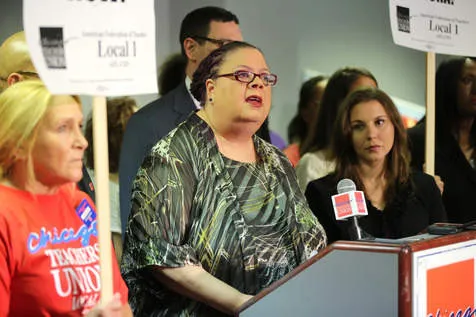‘The Spectacle Was Depressing When One Considers What’s at Stake’

Chicago Teachers Strike — A Postmortem – Public Sector Inc. Forum
In Chicago, the Teachers’ Last Stand

As this post is written on Friday afternoon, it appears that, by ordering the illegal strike that began on September 10, the militant bosses of the Chicago Teacher Union (CTU/AFT/AFL-CIO) will secure their key objectives of protecting their worst-performing members from being fired and ensuring that, if these same poor performers are laid off due to a school closing, they have priority based on their seniority when new jobs open up elsewhere in the school system. The imminent victory for the CTU, assuming it materializes according to media accounts, will be a defeat for schoolchildren, parents, taxpayers, and superior teachers who have been on the job a relatively short period of time.
Most of the media coverage of the strike has focused on a supposed “man bites dog” aspect of the story: The strike pitted teacher union bosses, who are bankrolling President Obama’s re-election campaign with their forced-dues treasury money this year, against Chicago’s Democrat Mayor Rahm Emanuel, formerly Obama’s chief of staff. The colorful rhetoric employed by Emanuel and CTU President Karen Lewis has also garnered much journalistic attention. Ultimately, though, this was not a “fun” story. As California-based writer and think tank leader Steven Greenhut pointed out in a commentary today (see the first link above): “Short-term politics aside, the spectacle was depressing when what’s at stake — the future success of the students held hostage to the mismanaged and bureaucratic Chicago school system.”
An AP report indicates a “compromise” floated by the mayor’s team would give laid-off teachers, regardless of how poor their performance, “the first right to jobs” in their subject areas “at schools that absorb children from the closed school.” This is contrary to an Illinois law under which principals are supposed to have the freedom to pick which teachers they hire. Anyway, as Businessweek reporter Drake Bennett observed in his account of the ongoing strike negotiations (see the third link above): “[I]n the world in which the vast majority of Americans work, the idea that an employer would have to hire [applicants] because they were previously laid off rather than because of their qualifications is laughable.”
Under Illinois law, as Paul Kersey of the Illinois Policy Institute noted in his own strike “postmortem” (see the second link above), teacher union officials arguably may lobby school districts to give hiring priority to laid-off teachers, but certainly may not call a strike over this issue. And teacher evaluations, the other central issue in the strike, aren’t even a matter that should be bargained over, according to state law. In order to end the strike, the mayor has by all appearances decided to ignore the law. Kersey explains:
[The pending] deal will be a bad one for children. The evaluation law in particular was meant to help students. By ensuring that school districts could identify both the best and the worst teachers, PERA [the Performance Evaluation Reform Act of 2010] made it possible for principals and superintendents to reward effective teaching and move inept teachers out of the classroom. PERA had the potential to improve teaching and ensure that every classroom had a capable teacher in front of it.
What happened instead is that CTU used their bargaining clout to subvert state law. They threw demand after demand – 19 percent raises, air conditioning, more nurses and social services – in the direction of a school distract that is basically broke. The union made enough economic demands that the district had to negotiate on things it should not have negotiated, and they eventually forced the district to water down evaluations.
It seems almost certain the outcome of the CTU strike will confirm what Right to Work supporters have long attested: Education labor laws (such as the one on the books in Illinois) that authorize teacher union bosses to grab monopoly-bargaining and forced-dues power over teachers represent a virtually insurmountable obstacle to real school reform.
If Illinois legislators want would-be reformist mayors and school boards to have sufficient clout to make their schools more efficient and effective, they need first to clean up the mess they made by handing special privileges to education union chieftains.

